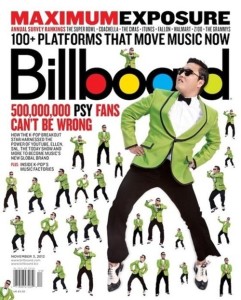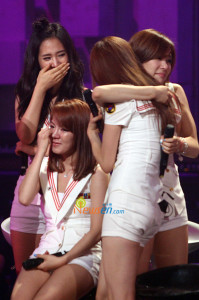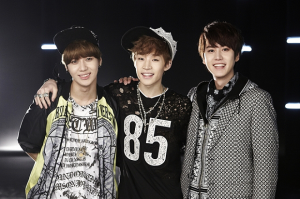 Let us to catch our breaths this week from the whirlwind of news and releases in the Hallyu world and focus inward on how we perceive who we are as participants and contributors to the K-pop fandom at large. Whether you’re a reader or writer (or both), we all gather at the Seoulbeats campfire for different reasons. We want to hear how Seoulbeats has made an impact on your fan experience. How has being a reader/writer of Seoulbeats affected your life and your relationship to fandom? How has Seoulbeats impacted the way you feel about the Hallyu Wave and K-entertainment?
Let us to catch our breaths this week from the whirlwind of news and releases in the Hallyu world and focus inward on how we perceive who we are as participants and contributors to the K-pop fandom at large. Whether you’re a reader or writer (or both), we all gather at the Seoulbeats campfire for different reasons. We want to hear how Seoulbeats has made an impact on your fan experience. How has being a reader/writer of Seoulbeats affected your life and your relationship to fandom? How has Seoulbeats impacted the way you feel about the Hallyu Wave and K-entertainment?
Ree: I think my fervor when it comes to K-pop has died down a fair bit from when I first joined Seoulbeats and so has my fandom engagement. With the latter, a part of it is linked to the fact I just don’t have that much time or energy to expend on it anymore, but I also think joining the Seoulbeats team made me more detached. Not because I have to watch fandoms throw vitriol at myself and my fellow writers/friends every now and then (okay, maybe a bit because of that), but when you’re constantly in contact with a group of K-pop fans who are on the same page as you with a lot of things, there’s just very little need to be immersed in a specific fandom anymore.
It’s definitely not because I think people who are involved in fandom life are lesser or anything — definitely not, I mean every single one of us are still in K-pop fandom and it’d be pretentious to pretend otherwise — but I feel like a lot of reason fandom is there is so you can meet, chat, or involve yourself with like-minded people. For me, I just get all of that at Seoulbeats.
In terms of how it’s affected my outlook on the Hallyu Wave and K-Entertainment, being a longtime reader of this site before I even joined, I can say I’ve always been skeptical of it. If anything, joining the Seoulbeats team itself may have made me LESS skeptical. I look at it a lot more critically, and as a result I can see it from a fair amount of different angles. Whilst I don’t think K-pop will ever hit the “mainstream,” rather than writing it off as nothing but propaganda, I acknowledge the fact that this music — from an entirely different language and culture — becoming as big as it is (even if it’s niche), is sort of great.
 Pat: It’s been six months or so since I’ve graduated college and aside from Seoulbeats, I don’t really do anything else productive. Because of this, my fan experience is still the same as before I became a writer — if anything it has doubled because my only activities before within a fandom was writing fanfiction. The only thing drastically different is that I pay attention to more artists and groups than I usually do.
Pat: It’s been six months or so since I’ve graduated college and aside from Seoulbeats, I don’t really do anything else productive. Because of this, my fan experience is still the same as before I became a writer — if anything it has doubled because my only activities before within a fandom was writing fanfiction. The only thing drastically different is that I pay attention to more artists and groups than I usually do.
Back when I was still only a reader of Seoulbeats, I fully appreciated the site for their editorial pieces on issues that needed to be spoken about such as the culture differences and how we can see that from the way everything is done. Prior to becoming a writer, Seoulbeats was a site I always checked because it looked deeper than the polished sheen of the K-pop idols. While I may not have always agreed with some pieces, I still had that appreciation for them.
As to how it has affected the way I look at the Hallyu Wave and K-Entertainment, like Ree, I’ve always had a skeptical view of it all. After becoming a writer, I’ve actually become more critical and logical about everything. Which is a fun thing especially when I get to use what I’ve learned from my major in K-Entertainment. I already spend most of my day either watching K-Dramas, or on Tumblr spazzing over K-pop idols. With Seoulbeats, I get to take all that and write about it in a critical manner. Although I admit to being surprised when a couple of my bad puns and analogies influenced by me fangirling critically somehow make it to the finished product (ie. that BTOB album review).
Fannie: You know, I’m sure there’s a certain subset of people out there who are convinced that we’re all just super jaded about K-pop (especially when one of our writers dares to critique their Precious Oppa) but I’ve actually found that being with Seoulbeats for the long-term has actually increased my appreciation of K-pop overall. And this is coming from someone who first joined the site primarily interested in writing cultural exposés on the dark side of the K-pop industry.
Part of it is that while having to sift through everything that comes out (since we have to be on top of the news and all the new releases) does mean wading through a lot of mediocre stuff; it makes me all the more appreciative of the GOOD stuff that comes out. The other part of it is just constantly being impressed by the sheer VOLUME of creative content and entertainment that comes out of the K-pop industry on a weekly basis. There’s never a dull moment and I can’t really say that about the majority of the other music industries out there.
 I was already somewhat detached from being heavily involved in fandoms by the time I started writing, so I can’t speak from the persona of someone actively involved in a specific fandom, but I do think that being on the team and getting constant feedback from the readers really forces you to accept that other people may have different preferences or opinions, and that’s absolutely okay.
I was already somewhat detached from being heavily involved in fandoms by the time I started writing, so I can’t speak from the persona of someone actively involved in a specific fandom, but I do think that being on the team and getting constant feedback from the readers really forces you to accept that other people may have different preferences or opinions, and that’s absolutely okay.
Gabrielle: Being a part of Seoulbeats has actually helped me feel a bit “closer” to the fandom. I have no friends that are into K-Pop so until I became a writer, I experienced K-Pop completely solo. I wasn’t apart of forums, and really didn’t comment on articles. It was just me and my thoughts, so I like having a place to talk about it. I really enjoy the comments that come from it to. I enjoy the conversation. Even if people aren’t agreeing with me, or completely hate what I wrote, I just love reading it (not to mention I get to totally fangirl when another blogger references me).
It also helped me learn to appreciate artists in different ways. I used to “poo-poo” artists that I saw as worthless, or not my idea of a good artist, but seeing all the reviews and articles, I get to appreciate the different parts of K-Pop, even if I don’t like them personally. It’s helped me articulate my feels about K-Pop and its culture, not to mention my own country’s media. It’s been a great way for me to do critical thinking now that I’m out of school. I don’t get graded, but it still gives me the same feeling.
Kelsey: I second Fannie’s comment on discovering the volume of content that K-pop manages to produce in such brief periods of time. There really aren’t too many music industries that require such vigilant watch for new material. It becomes very demanding keeping track of everything that happens in the K-pop world, but I’ve enjoyed finding some of the neglected music that falls through the cracks and could use a lot more love. It’s easy for an outsider to say that K-pop is a homogeneous genre, but writing for the site quickly alerts you to how many different types of sounds there really are out there. That being said, after I joined the team, I do have to encounter the duds way more often, but maybe that’s what makes the good stuff really good.
Other than that, I appreciate that Seoulbeats has made me more conscious of the business aspect of music. In one dimension, you deal with the groups and what they produce, and after that there’s the layer of the media. But the corporate piece is tough to unwrap completely because of the lack of transparency, and that can make the business of K-pop an interesting mystery to ponder over from time to time on the site. So in this way, I’d say my connection to K-pop hasn’t really intensified or lessened — it’s at the same level but it’s changed form a little, maybe. But all in all, it’s good fun and I’m glad that this has yet to change.
 Nicholas: I would probably say that I am slightly different there. When I first joined, I was very into fandom, and had lots of opinion on what I thought was right (and wrong), but that was not what the guys I hung around with were really in for.
Nicholas: I would probably say that I am slightly different there. When I first joined, I was very into fandom, and had lots of opinion on what I thought was right (and wrong), but that was not what the guys I hung around with were really in for.
So after I came here, a year on, my thoughts have changed. I ended up spending a fair chunk of time giving opinion and analysis, such that I was not really into fandom, maybe because I just ended up seeing too much into things. I would still happily contribute to a good cause in any fandom though, and you could still find me knocking back at a good concert or quality album from home. Just don’t make me say that idols are godly creatures that have changed my life.
One thing that has improved after a year though, is the quality of music. I still think Korea has really gotten the process of idol-making really down to a T. Watching music shows, you end up seeing a universally decent standard of dancing and singing, which makes it pretty easy to ignore the mediocre acts. Of course, the good stuff, by a combination of better composition and stage charisma, still makes itself shown clearly.
Something I would still really want to unravel though, would be the whole idols dating conundrum, as well as the varied aspects of needing to behave in accordance with an “Idol Code”. I know it might be just how they roll, as well as how we have no right to impose Western standards on other forms of culture, but still it’s something I think about (as well as parody).
Laverne: Like a lot of the other writers, writing for Seoulbeats actually made me more active in the K-pop fandom because I have to stay abreast of the latest news. It’s also given me a lot of respect for K-entertainment. There’s definitely points to criticize but I’m amazed at the sheer number of songs and idols produced each year — many of them worthwhile.
Seoulbeats has also made me think critically of the system and actively come up with my own points instead of simply reading articles and agreeing with them. This actually adds to my enjoyment because I’m able to enjoy the little details instead of just taking the production at face value. I love writing for Seoulbeats so much that it sometimes takes precedent over my school work and I end up doing things like replying to this Roundtable instead of working on papers due this week.
 Shweta: Writing for Seoulbeats has made me a critical consumer of popular culture. Period. In fact, this is pretty much a given considering the nature of the site. That being said, unlike most writers here, what I feel is the greatest contribution Seoulbeats has made to my life is that it has changed my approach to and understanding of music. I’ve become far more astute about what makes music successful and meaningful at both a technical and subjective level. From that perspective, K-pop the musical genre has only become more interesting over the months I’ve spent here; not in just how I think about it it, but in what facets I choose to think about.
Shweta: Writing for Seoulbeats has made me a critical consumer of popular culture. Period. In fact, this is pretty much a given considering the nature of the site. That being said, unlike most writers here, what I feel is the greatest contribution Seoulbeats has made to my life is that it has changed my approach to and understanding of music. I’ve become far more astute about what makes music successful and meaningful at both a technical and subjective level. From that perspective, K-pop the musical genre has only become more interesting over the months I’ve spent here; not in just how I think about it it, but in what facets I choose to think about.
Anyway, it’s an incredible gift to be given and to partake in discussion with perceptive people. Thank you all for being noteworthy in that respect — writers and readers alike. Whether or not I become lukewarm about K-pop and fandom in the future, I will always appreciate that aspect of the site. Pop culture is what it is; what’s really important is what you choose to make of it while it’s there.
Ambika: I’d say writing for Seoulbeats has made it easier to reflect on my own country’s society and made more apparent numerous issues. When you’re looking at a functional aspect of another country’s system, I think it’s easier to pick out parts you disagree with or can see room for improvement in and bring back that criticism to just take a second look around yourself. Perhaps it’s just thoughts that come as you grow up, but it’s a bit disillusioning to reevaluate your own society and culture. It’s also been great to understand other points of view and a bit of what’s behind it. As for fandom involvement, I have a broader scope regarding what I’m aware of. Actual involvement I usually measure by time, and that just depends on my personal time available.
If anything, my standards of performance have become higher through greater exposure to music and performance. Like the others mentioned, there’s this high volume of content that’s regularly released, so there are a lot of opportunities to become both exposed to and accustomed to a certain level of performance to be properly engaged.
 I know that the Hallyu Wave is present and has made moves in just the last year, but as to how well it’ll become something more fixed in the Western world, I’m still skeptical. That much has not changed since I joined Seoulbeats.
I know that the Hallyu Wave is present and has made moves in just the last year, but as to how well it’ll become something more fixed in the Western world, I’m still skeptical. That much has not changed since I joined Seoulbeats.
Mark: Like Gabrielle, I too was a K-pop loner before I became a part of the Seoulbeats family. I was also an avid reader of the site before I became a writer and so I figured it be a natural transition for me to become a writer since I was already spending so much time on here anyways. Like Ree and Fannie, I too feel detached from the majority of K-pop fandom though I don’t necessarily believe that is the fault of Seoulbeats.
One major thing that the site did for me was that it exposed me to different aspects of fandom and idoldom that I never knew existed. Furthermore, writing for the site exposed me to another aspect of fan participation that I never paid much heed to until it came at me with a downright fury — netizen comments!
I’m really curious to hear from our readers what your fan experience is like and how it’s similar or different from ours. Please share!
(Images via TS Entertainment, YG Entertainment, Billboard, SM Entertainment, JYP Entertainment, Newsen)


